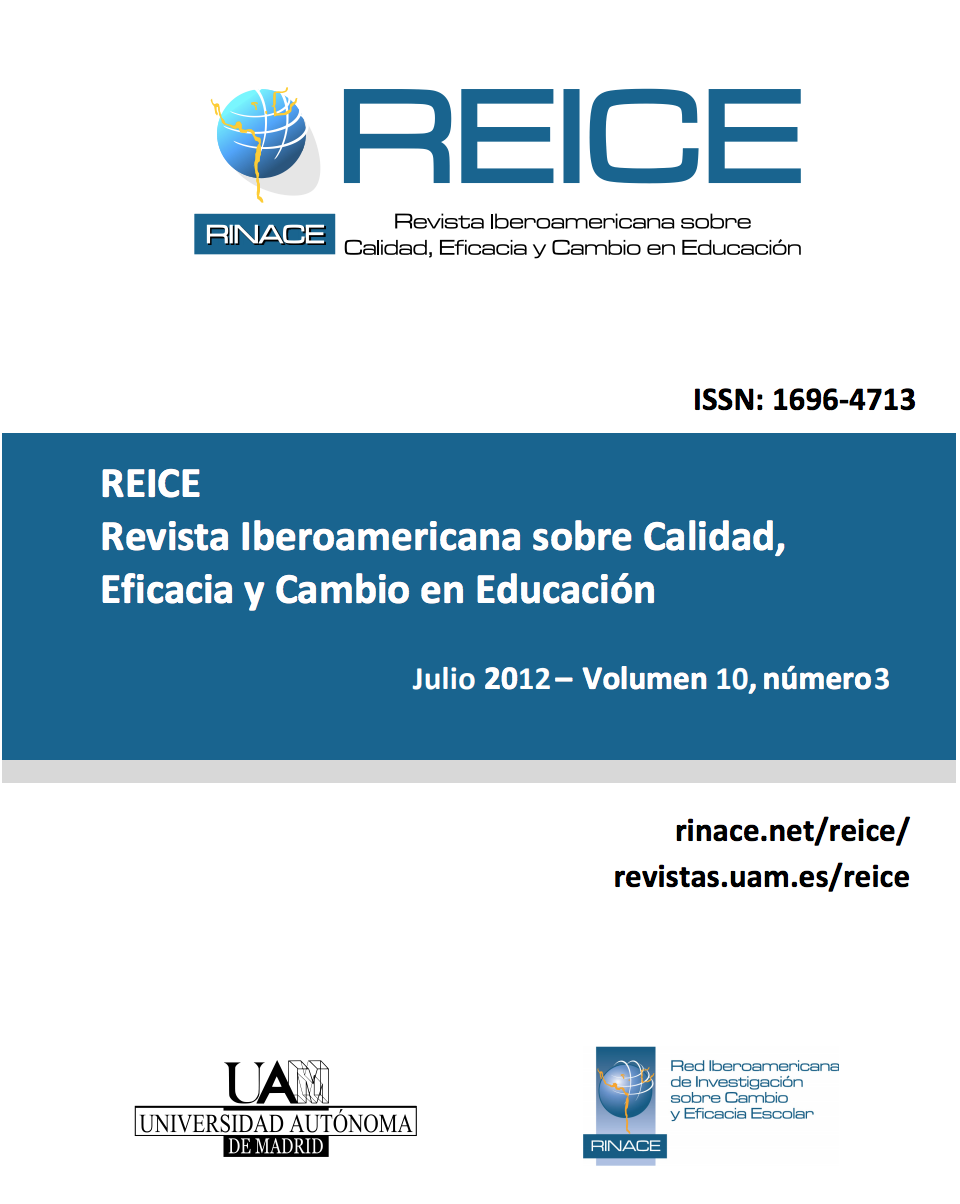¿Is the Teachers’ Language Creative? Analysis of its Most Frequent Expressions
Keywords:
Language of Pedagogy, communication skills, concept formation, creative teaching, specialized language, connotation, speechCopyright (c) 2016 REICE. Revista Iberoamericana sobre Calidad, Eficacia y Cambio en Educación

This work is licensed under a Creative Commons Attribution-NonCommercial-NoDerivatives 4.0 International License.
Abstract
The concern for the analysis of the language of Pedagogy has not received special attention. The education field has spread and, consequently, its language has become universal: new terms are created, some have diverted meanings from the common language with restrictive features in the education context, others may have multiply specialized databases, etc. This is due to the constant change processes that take place both in the workplace and in the Higher Education Area, being the introduction of new terminology one of the most important implementations. Special emphasis is placed on reconciling Higher Education with professional working needs. We face up a new education context that highly requires specific tools to promote a deep process of change with regard to planning, strategies and curriculum in Education. These changes will have subsequent effects in education terminology, institutions, schools and universities. This paper shows an analysis of the terms of the language of Pedagogy as far as they are a vehicle of knowledge in the teaching-learning situations. On the other hand, it is a creative specialized language as it does not have a cryptic function, the value and meaning of its expressions depends on the uses, what offers a great connotative power to the teacher’s language. Its thematic and social exclusivity aimed to encourage creativity is analyzed.
Downloads
References
Alcaraz, E. (2006). Aproximación al lenguaje de la Farmacia. An. R. Acad. Nac. Farm., 72, 344-360.
Alcaraz, E. (2007). El inglés jurídico norteamericano. Barcelona: Ariel.
Avizora (2009). Glosario de Términos Pedagógicos http://www.avizora.com (10 Oct. 2011).
Bernat, A. (1992). La reforma educativa como lenguaje vacío. VIII Congreso de Lenguajes Naturales y Lenguajes Artificiales, pp. 197-204. Universidad de Barcelona, Barcelona.
Blasco, E. (2002). La lexicalización y las colocaciones. Lingüística Española Actual, XXIV, 1, 35-63.
Bolívar, A; Rodríguez Diéguez, JL. (2002). Reformas y retórica: La reforma educativa de la LOGSE. Málaga: Aljibe
Broudy, H. S. (1964). The role of analysis in educational philosophy. Educational Theory, XII, pp. 261-269
Cabré, Mª T. (1993). La terminología. Teoría, metodología, aplicaciones. Barcelona: Antártica/Empúries.
Casares, J. (1950). Introducción a la lexicografía moderna. Madrid: CSIC.
Edel, A. (1972). Analytic philosophy of education at the crossroad. Educational Theory, XXII, pp. 131-153.
Equipo Multidisciplinario de Profesionales del sector de la Educación (2009): Ciberdocencia (DESP) http://ciberdocencia.gob.pe/archivos/GLOSARIO_Guia_Practica_parte_3.pdf (19 sept. 2011).
Esteve, J. Mª. (1979). Lenguaje educativo y teorías pedagógicas. Madrid: Anaya.
Iqpib (2002). Glosario de términos relacionados con la cualificación y la formación profesional. Consejería de Educación y Cultura, Islas Baleares http://iqpib.caib.es/user/info/documents/GLOSARIO2002.pdf (25 nov. 2011).
Klein, Th.W. (1985). Architecture as a Metaphor for Development of Culturally Adapted Minority Education Programs. Final Report of the Regional Study Award Project. Northwest Educational Laboratory. Portland : Center for Performance Assessment.
Kneller, G.F. (1969). La lógica y el lenguaje de la educación. Buenos Aires : El Ateneo.
Kocourek, R. (1982). La langue française de la technique et de la science. Wiestbaden: Brandstetter.
Koiké, K. (2000). Colocaciones léxicas en el español actual. Análisis formal y léxico semántico. Madrid: UNED.
Koiké, K. (2002). Comportamientos semánticos en las colocaciones léxicas. Lingüística Española Actual, XXIV, 1, 5-25.
Komisar, P.B. (1971). «Necesidad» y currículum organizado en torno de las necesidades de los alumnos. En SMITH, B.O. y ENNIS, R.H. (eds.) (1971): Lenguaje y conceptos en educación, pp. 213-234. Buenos Aires: El Ateneo.
Lerat, P. (1997). Las lenguas especializadas. Barcelona: Ariel.
Martín, J. (1996). Los lenguajes especiales. Granada: Comares.
Mendívil, J. L. (1991). Consideraciones sobre el carácter no discreto de las expresiones idiomáticas. En Martín, C. (Ed.), Lenguajes naturales y lenguajes formales (pp. 711-735). Barcelona: PPU.
Mendívil, J. L (2009). Palabras con estructura externa. En De Miguel, E. (coord.) (2009), Panorama de lexicografía (pp. 83-113). Barcelona: Paidós.
Miall, D. S. y Vondruska, R. J. (1983). Affective implications of Metaphor and Simile in Discourse. Technical Report, núm. 301, pp. 31.
Mingorance, P. (1991). Metáfora y pensamiento profesional. Sevilla: GID.
Peters, R. S. (1966). Etics and Education. London: Allen and Unwin.
Riaces (2004). Glosario Internacional RIACES de Evaluación de la Calidad y Acreditación: http://www.riaces.net/glosarioa.html (3 nov. 2011).
Rodríguez, B. (1981). Las lenguas especiales. El léxico del ciclismo. León: Colegio Universitario de León.
Rodríguez, B. y García, P. (1992). Lenguajes científico-técnicos y diccionario. En III Simposio de RITerm – Actas 1988-2002. San Millán de la Cogolla, La Rioja http://www.riterm.net/actes/3simposio/rodrig.htm (28 oct. 2011).
Rondeau, G. (1983). Introduction à la terminologie. Chicoutimi Québec : Gaëtan Morin
Ryle, G. (1949). The Concept of Mind. London: Hutchinson.
Sánchez, S. (1988). Diccionario de las Ciencias de la Educación. Madrid: Santillana.
Sánchez, S. (1991). Léxicos. Ciencias de la Educación. Tecnología de la Educación. Madrid: Santillana.
Sánchez De Zavala, V. (1965). Enseñar y aprender. Barcelona: Península.
Scheffler, I. (1960). The Language of Education. Illinois: Springfield.
Smith, O. y Ennis, R. H. (1971). Lenguaje y conceptos en educación. Buenos Aires: El Ateneo.
Sternberg, R. J. y Lubart, T. I. (1997). La creatividad en una cultura conformista. Barcelona: Paidós.
Vendryes, J. (1929). Le langage. Introduction linguistique à l’histoire. Paris : La Renaissance.
VV.AA. (2002). Diccionario enciclopédico de Educación. Barcelona: Grupo Editorial CEAC
VV.AA. (2003). Diccionario Pedagógico de la Asociación Mundial de Educadores Infantiles (3 dic. 2011).
